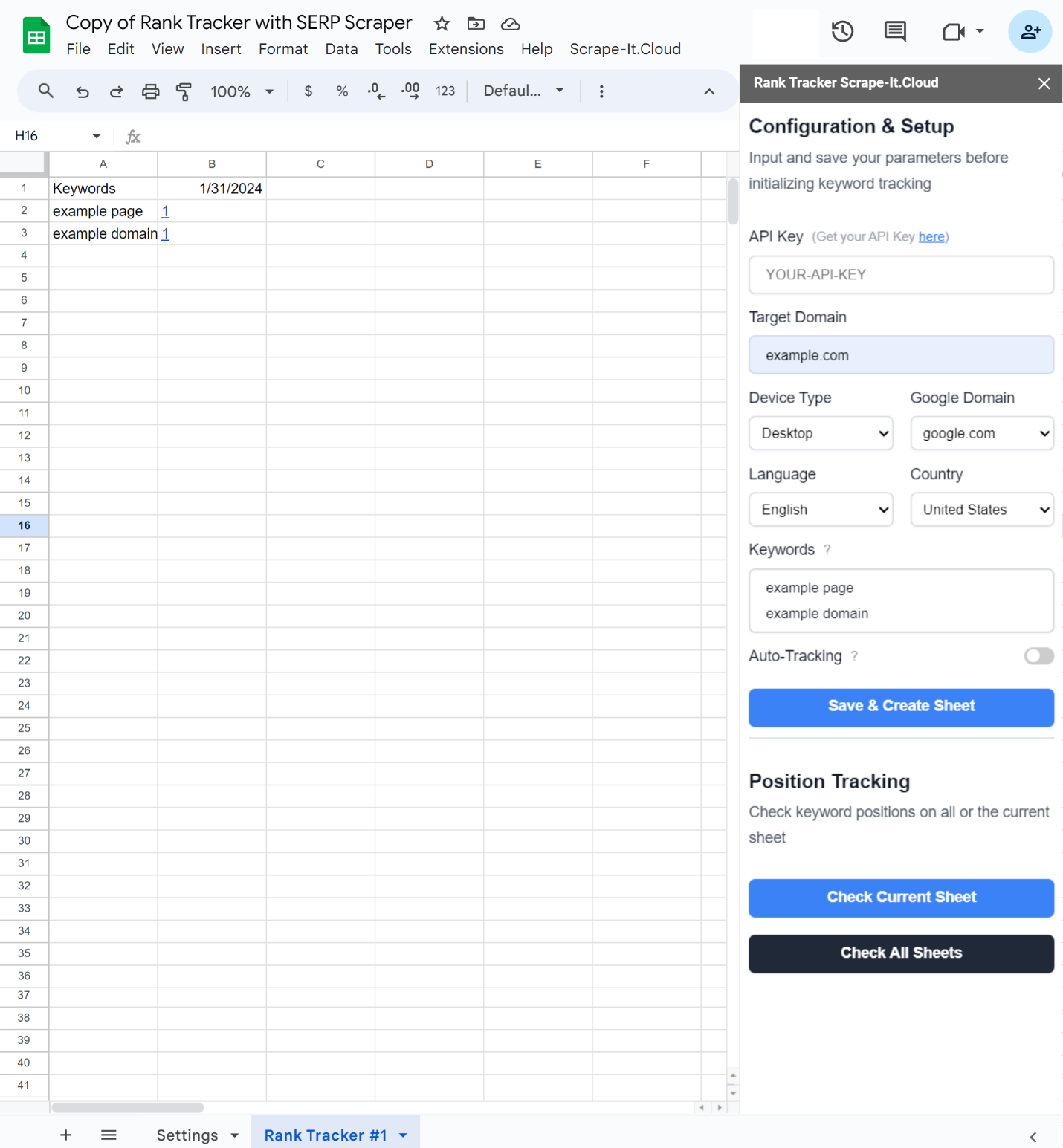Search engine optimization (SEO) is essential for any business or website that wants to be successful online. It's optimizing your website and content to rank higher in search engine results pages (SERPs). Web scraping is a powerful tool that can collect data from various sources, including competitor websites, search results, and other resources. This data can then be used to improve your SEO by providing insights into your competitors' strategies, identifying trends in search results, and understanding the needs of your target audience.
This article will explore the benefits of web scraping for SEO, showcase practical examples, and offer tips for effective implementation. Whether you're new to SEO or looking to refine your existing strategies, this guide can help you leverage web scraping to unlock your website's full potential.
Get fast, real-time access to structured Google search results with our SERP API. No blocks or CAPTCHAs - ever. Streamline your development process without worrying…
Google SERP Scraper is the perfect tool for any digital marketer looking to quickly and accurately collect data from Google search engine results. With no coding…
Understanding Web Scraping in SEO
Typically, scraping is used to collect and analyze competitor information. This information, when it is accurate and up-to-date, can have a significant impact on a company's SEO efforts.
The data you extract can be used for both market research and competitor tracking, empowering you to respond to their actions promptly. Gather data on products, prepare reports, analyze your competitors' most successful SEO strategies, and learn from their experience. All of this can be easily achieved with the right web scraping tools.
Use Cases of SEO Scraping
Let's dive into specific examples of how you can leverage this powerful tool to gain a competitive edge:
-
Track keyword performance: Monitor competitors' keyword rankings to discover valuable keywords for your content, increasing your organic traffic.
-
Winning content: Examine competitor content to understand popular topics and structure. Use this data to improve your content strategy and engage your audience.
-
Stay ahead of trends: Scrape industry forums, subreddits, blogs, and social media to identify emerging trends, allowing you to adjust your content and offerings to stay competitive.
-
Unlock SERP insights: Analyze Google SERP data to understand search results, featured snippets, and user intent. Use this information to optimize your content for better visibility and organic traffic.
Keyword Research and Analysis
Web scraping can extract data on keywords frequently used in the titles, meta descriptions, and content of high-ranking SERPs. This can help you identify the most related keywords for your content and use them to optimize your pages.
Additionally, web scraping can be used to research the most successful pages of your competitors and identify the keywords they are using. This can help you understand how to improve your pages and attract more visitors.
Rank Tracking
Tracking your rankings is an essential part of any SEO strategy. That's why we've written several articles on how to do it, including how to track rankings using Google Sheets, track local rankings, track Google SERP history, and even create your keyword rank tracker in PHP.
The easiest way to track your rankings is to use one of the tools we've covered in our articles. For example, to use our Google Sheets rank tracker, you only need to copy the template and install the add-on powered by our Google SERP API. Once you've done that, you can check your site's rankings for any keywords you want, or you can set up automatic, recurring ranking checks.

Alternatively, you can follow our instructions to create your rank tracker using our API with Zapier or Make.com. This will allow you to track your rankings easily and customize your integration so that the data comes to you in the way that's most convenient for you, such as in your email inbox.
Here are some additional tips for tracking your rankings:
-
Monitor multiple keywords: The more keywords you track, the better you'll understand your overall SEO performance.
-
Track rankings over time: This will help you identify trends and adjust your promotion strategy accordingly.
-
Compare your rankings to competitors: This will give you a better understanding of how you stack up in Google search results.
By following these tips, you can track your rankings effectively and make sure your strategy is on track.
Competitor Analysis
In addition to tracking keyword rankings, expand your competitor analysis by extracting data directly from their websites. This includes analyzing their:
-
Meta tags: Uncover their targeted keywords and how they structure them.
-
Content structure: Understand their preferred H1-H6 hierarchy and content organization.
-
Internal linking structure: See how they connect different pages and prioritize content.
-
Technical SEO aspects: Identify their technical implementations, like schema markup.
By delving deeper into competitors' websites, you gain a comprehensive understanding of their SEO strategies, content approaches, and user engagement tactics. This knowledge empowers you to identify areas for improvement in your own website, develop targeted content marketing strategies, and stay ahead of the curve in your niche.
Finally, you can track backlinks to your site and your competitors' sites using web scraping. This will allow you to assess the quality and quantity of links and identify potential sources for creating new backlinks to your site.
In a previous article, we explored the best SEO APIs that can enhance your SEO efforts. We also discussed how to use web scraping to swiftly extract data from SEO tools like Majestic. By combining the power of APIs and data extraction, you can unlock a wealth of insights to inform your digital marketing strategy.
Content Optimization
Web scraping allows you to optimize your content for better search engine ranks and user engagement. Here are three powerful ways to use scraped data for content optimization:
1. Gather competitive intelligence: Automate the collection of content from competitor websites to identify high-performing topics and uncover gaps in their coverage. This valuable information allows you to develop content that fills these gaps, providing unique value to your audience and establishing your authority in the niche.
2. Inspect content structure: Extract data from competing articles to understand how they structure their content, including the use of headlines, lists, images, and other elements. This analysis helps you optimize your own blog posts' structure for better readability, engagement, and SEO performance.
3. Collect user feedback: Scrape comments from competitor pages, forums, and subreddits to gain insights into what interests your target audience. By understanding their questions, concerns, and preferences, you can tailor your content to address their needs.
Google SERP Scraper is the perfect tool for any digital marketer looking to quickly and accurately collect data from Google search engine results. With no coding…
Gain instant access to PAA boxes from Google SERP and uncover the questions your audience is asking. Leverage this valuable data to create high-quality content that…
Practical Web Scraping Tools for Better SEO
To improve your website's SEO with scraping, you should first determine which web scraping tool is right for you. Depending on your needs, you can use one of these options:
-
SERP APIs are a robust and versatile choice for SEO-focused scraping, especially for those who want to develop customized solutions. For instance, you can use a SERP API to develop your own keyword scraper by collecting "Related Searches". While this is just one way of its capabilities, a SERP API generally offers a wide range of functionalities. This makes it an invaluable asset for SEO professionals aiming to stay ahead of the curve.
-
Web scraping API is a more flexible option, as APIs can be provided for scraping specific resources or any page in general. Using an API allows you to develop flexible tools that meet your needs. You can use specialized platforms such as Zapier or Make.com to make it easier.
-
Creating your script is an option unsuitable for everyone and requires coding skills. Although this option is limited only by the skills of the person who makes it, it has several challenges and limitations that can be easily solved using a web scraping API, such as bypassing blocks, solving CAPTCHAs, JS rendering, connecting proxies, and more.
To sum up, the choice of web scrapers should align with your specific goals and technical capabilities. SERP APIs are excellent for those seeking to craft tailored SEO solutions, offering a broad spectrum of functionalities for comprehensive insights. If you require versatility and the ability to scrape various resources, a web scraping API is a formidable choice, with platforms like Zapier or Make.com simplifying the development process. Creating your script remains a potent option for those with coding proficiency, particularly when handling complex data or navigating intricate web environments. Each of these tools gives you the opportunity to utilize the full potential of web scraping to improve the effectiveness of your SEO campaigns.
Tips and Tricks for Effective Web Scraping
To make scraping more effective, here are a few tips to remember. We won't be discussing the technical challenges you may face if you decide to build your own tool, but rather focus on what's essential for you from the perspective of using this technique to improve SEO:
-
Choose suitable sources. First, identify the essential resources you can use to scrape data, such as competitor analysis. Choose them following your needs.
-
Choose the correct data. Once you have identified the resource, identify the specific elements you need for SEO analysis. Focus on key elements such as meta tags, titles, keywords, backlinks, etc.
-
Choose the right tools. You can use different tools for each case as long as they can collect the data you need from the selected source and return it in a convenient format.
-
Use automation for regular monitoring. Data is only valuable when it is up-to-date. So, to keep it up-to-date and not waste your time, create a system for regularly monitoring changes on competitor websites and collecting real-time data.
In general, web scraping is the right tool to improve your SEO, stay competitive, always find new ideas and track trends.
Conclusion
In conclusion, web scraping is one of the pivotal tools in the arsenal of any SEO professional. By right-selecting sources, pinpointing the relevant data, and utilizing the appropriate tools, you can gain a wealth of critical insights for a successful SEO strategy.
All of this provides a deeper understanding of competitors' strategies, market trends and keyword research and enables regular monitoring and real-time data collection, keeping your SEO tactics agile and informed.

